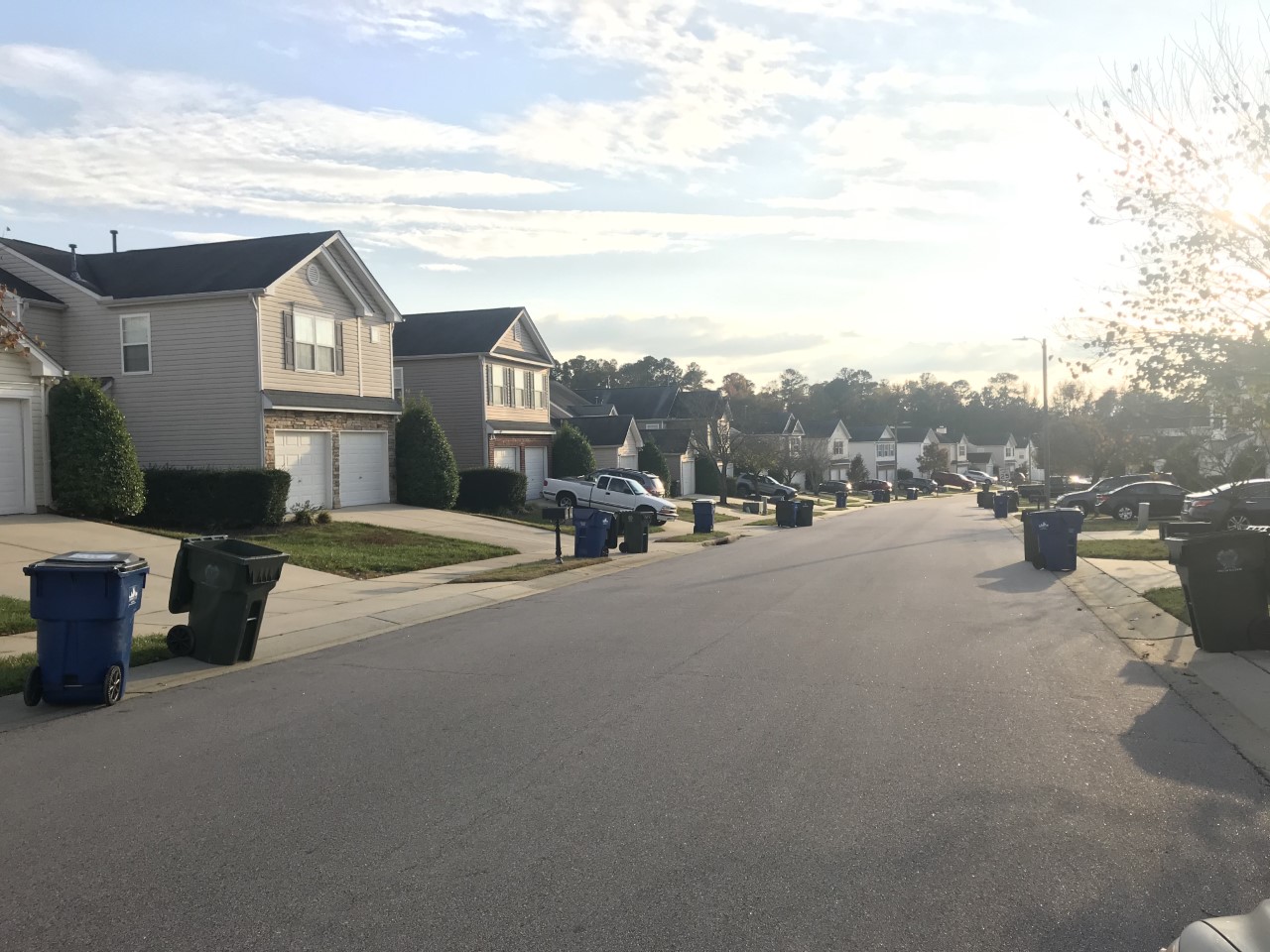Rows of houses line the edges of Harrington Grove in the north Raleigh suburbs. Fifteen years ago this precinct was solidly Republican, but times have changed. (Photo courtesy of Jacob Smith)
The suburbs. The Merriam-Webster dictionary defines them as “the residential area on the outskirts of a city or large town”. Families move to the suburbs for many different reasons: to get away from the bustling city, they’re easy to commute from, and being great places to raise families. When I hear the word suburb, the first thing that comes to mind are the sprawling neighborhoods of cookie-cutter houses in Orange County, California. Some minds may go to the more local suburban neighborhoods of Harrington Grove, Dominion Park, and Brier Creek that fill the Leesville area.
Though most people probably don’t think about the suburbs impact in the political world. These residential areas used to be Republican strongholds. Orange County, California used to be Reagan country. This ruby red county is where the former Governor of California kicked off his bid to become the 40th president of the United States. But the Trump era has flipped everything on its head.
Hillary Clinton won Orange County in 2016 by eight percent over President Trump. In 2016, Republicans held four of the seven congressional districts that are in, or are a part of, Orange County. After the 2018 midterms, Republicans held none of the seven districts.
Politicians have been seeing this suburban revolt against the GOP all over the county. When Democrats won back the House of Representatives in 2018, they did it by winning the suburbs. Democrats flipped two districts in the suburbs of Chicago, two outside of Miami, two outside of Minneapolis, and three outside of Philadelphia. We’ve even being seeing this locally in the neighborhoods around Charlotte and Raleigh. Democrats flipped three state house districts in Wake County, and four in Mecklenburg. Now there are no Republicans in the state house representing either county.
“When I was running, my voting block was women. I think that women have been particularly affected by President Trump’s presidency and his way of governing. I think women are turned off by that… I think that college-educated women that live in suburbs are tending to vote more Democratic because of President Trump,” said State Representative Julie von Haefen (D-Wake) in a phone interview with The Mycenaean. Von Haefen flipped her southern Wake County district, which stretches from Apex to Fuquay-Varina, in 2018 after a fourteen year hold on the district by Republicans.
Von Haefen’s district, like most of Wake County, has seen exponential growth in the last ten years, going from farmland to neighborhoods. Von Haefen also credits the trends on this growth.
“Trump has accelerated the changes in our politics. The suburban swing had been going on before Trump, but he has accelerated it. College educated whites, once a staple of the GOP, are fleeing the party. The Republican Party’s shift towards cultural conservatism and hawkish immigration policies have caused this,” said Drew Savicki, a political analyst and cartographer, via Twitter direct message.
In 2012, North Carolinians elected Pat McCrory to the Governor’s office. McCrory won in a landslide, even carrying Mecklenburg and Wake Counties, which hold Charlotte and Raleigh. Even as late as 2012, much of Mecklenburg County elected Republican Sue Myrick to Congress.
But in today’s politics, it would be nearly impossible for a Republican to win either Mecklenburg or Wake Counties. “Trump certainly was part of it. Wake County voted for George W. Bush in 2000 and 2004, but it voted for Hillary Clinton by 20 percentage points in 2016 and now Wake County has an entirely Democratic delegation in the NC House of Representatives,” said Jacob Smith (no relation to the author), a political scientist who teaches in the Thompson Writing Program at Duke University, in an email to the Mycenaean.
But does this trend even matter? Yes, Democrats may be winning in the suburbs but does this change anything? Yes and no. While the trends in the suburbs help Democrats win more seats in the House of Representatives, it’s not very much help elsewhere. “In other places, you see suburban areas zooming to the left as rural areas go to the right and they kind of cancel each other out. One area where the increasing support of rural areas for Republicans is helping them is the Senate because each state gets two senators regardless of population, allowing them to benefit from rural states having more sway than urban/suburban, highly populated states,” said Smith.
If Democrats want to really make gains in both the House and the Senate, then they have to field candidates who can appeal to both moderate suburban voters, conservative leaning rural voters, while also driving turnout in booming urban areas. If Democrats aren’t able to run those types of candidates, we’ll be stuck with a government divided between Democrats and Republicans.

Hi! My name is Jacob Smith and I am a staff writer for The Mycenaean. I am also a political activist and volunteer.
